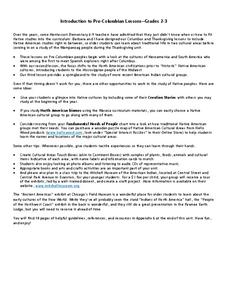Roy Rosenzweig Center for History and New Media
European Explorers
To compare how the Spanish, French, and English approached the exploration of North America, class groups examine primary source documents and become experts on one of four explorers: Francisco Coronado, Robert LaSalle, Samuel de...
University of Florida
Sailing to St. Augustine
Using a Florida map from 1597, young explorers consider the physical characteristics they would need in a site for a new colony and the resources they would need to survive. After selecting a site, class members research to discover the...
California Academy of Science
A Day in the Life of a San Francisco Native Animal
Before Google, before Sillicon Valley, before the Gold Rush, the San Francisco landscape was a biome filled with grizzly bears, mule deer, tule elk, coyotes, gray fox, gophers, and moles. To explore the early days of yesteryear, kids...
K12 Reader
Conflict Over North American Lands
Readers are introduced to some of the conflicts that arose over land and resources in the Americas in a two-part cross-curricular comprehension worksheet that asks kids to study the article and then to use information provided to respond...
PBS
Latino Americans: Timeline of Important Dates
From 1500-2000, an interactive timeline details important events related to Latino Americans. Next, to each date are small, yet informative blurbs—some of which include videos.
Midwest Institute for Native American Studies
Introduction to Pre-Columbian Lessons
Native peoples established civilizations all over Central and North America. Introduce native civilizations with a unit that promotes discussion, reinforces map skills, enhances reading comprehension, and exposes young historians to the...







